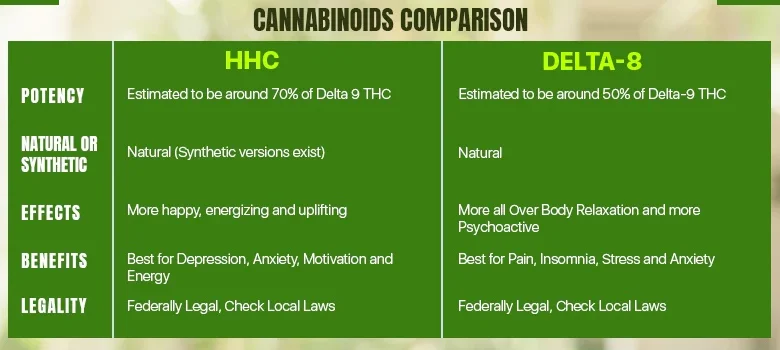HHC vs Delta 8: A Complete Guide to Understanding the Differences

Introduction: The Rise of Alternative Cannabinoids
The cannabis industry has evolved rapidly over the past decade, moving far beyond just THC and CBD. Today, consumers are exploring a wide range of cannabinoids that were once virtually unknown. Among these, two compounds have gained significant popularity in the hemp and cannabis community: Hexahydrocannabinol (HHC) and Delta 8 THC. Both are often marketed as legal alternatives to traditional Delta 9 THC, the main psychoactive compound in marijuana.
But with new options comes new confusion. Many consumers find themselves asking: What’s the difference between HHC and Delta 8? While both compounds offer similar experiences, their effects, legality, and even how they’re made vary considerably.
In this article, we’ll break down everything you need to know about HHC vs Delta 8, from their origins and effects to their safety, legality, and market availability. By the end, you’ll have a clearer picture of which one may be right for you—or whether you want to try either at all.
What Exactly Is HHC?

HHC, short for Hexahydrocannabinol, is a hydrogenated form of THC. It was first discovered in the 1940s by American chemist Roger Adams, who added hydrogen molecules to THC in a process similar to how vegetable oil is turned into margarine. Although it’s been around for decades, it only recently started appearing on store shelves as part of the hemp-derived cannabinoid boom.
One of the biggest draws of HHC is its stability. Unlike THC, which degrades into CBN (Cannabinol) over time, HHC is much more resistant to heat, light, and air. This makes it appealing for companies producing long-lasting edibles, vapes, and tinctures.
Effects-wise, HHC is often described as somewhere between Delta 8 and Delta 9 THC. Many users say it produces a euphoric high that is relaxing yet stimulating, depending on the dose. However, experiences vary widely, and because research on HHC is still limited, much of what we know comes from user reports rather than formal studies.
What Exactly Is Delta 8?
Delta 8 THC, or Delta-8-tetrahydrocannabinol, is another naturally occurring cannabinoid found in very small amounts in the cannabis plant. To make it commercially viable, manufacturers typically convert CBD from hemp into Delta 8 through a chemical process. This has made it more accessible to the market since hemp-derived products are legal under federal law, provided they contain less than 0.3% Delta 9 THC.
Delta 8 is often called the “lighter” version of traditional THC. Its psychoactive effects are milder compared to Delta 9, making it appealing to people who want a buzz without overwhelming anxiety or paranoia. Many users describe Delta 8 as clear-headed, relaxing, and mildly euphoric, making it popular for both recreational and therapeutic use.
One of the reasons Delta 8 exploded in popularity is its availability. Thanks to the 2018 Farm Bill, Delta 8 products are sold in vape shops, convenience stores, and even online—though some states have since banned it due to regulatory concerns.
HHC vs Delta 8: The Psychoactive Experience
When comparing HHC vs Delta 8, one of the first questions people ask is: Which one gets you higher? The answer isn’t straightforward because both cannabinoids interact with the body differently.
For most users, Delta 8 produces a gentler high. It’s often described as relaxing and slightly euphoric without being overwhelming. This makes it especially popular among people who find traditional Delta 9 THC too strong. It’s often a good choice for evening use, social activities, or simply winding down after a long day.
HHC, on the other hand, tends to feel slightly stronger and more stimulating. Some users report feeling more energy, focus, or even mild euphoria compared to Delta 8. Others say it’s closer to Delta 9 in terms of intensity but with fewer side effects like paranoia. However, because it’s newer on the market, experiences vary, and the lack of scientific studies means we don’t yet fully understand its psychoactive profile.
Ultimately, if you’re looking for a smooth, mellow high, Delta 8 may be your best bet. If you want something closer to traditional THC but still a bit different, HHC might be worth exploring.
Safety and Side Effects
When it comes to cannabinoids like HHC vs Delta 8, safety is always a major concern—especially since both are relatively new to the mainstream market.
For Delta 8, studies are limited, but anecdotal reports suggest side effects are similar to other forms of THC: dry mouth, red eyes, mild drowsiness, and in some cases, anxiety or dizziness. Because it’s weaker than Delta 9, these effects are usually milder, but they still exist. The bigger concern with Delta 8 is the production process. Since most Delta 8 is synthesized from CBD, the chemicals used in conversion can leave behind residues if not handled properly. This makes it critical to buy from reputable companies with third-party lab testing.
HHC carries similar safety concerns. While it is considered stable and potentially longer-lasting, there hasn’t been enough scientific research to fully evaluate its health effects. Users generally report side effects similar to THC: changes in mood, dry mouth, or altered coordination. Once again, the bigger issue is the manufacturing process. Because HHC is typically hydrogenated from other cannabinoids, ensuring purity through lab testing is essential.
In short, both HHC and Delta 8 appear relatively safe in moderate amounts, but the real risk lies in unregulated products. If you’re considering either, look for companies that provide transparent testing and avoid cheap, questionable sources.
Legality: HHC vs Delta 8
The legal status of HHC vs Delta 8 is a tricky subject because laws are constantly changing.
Delta 8 is technically legal under the 2018 Farm Bill, as long as it’s derived from hemp and contains less than 0.3% Delta 9 THC. However, many states have moved to ban or restrict Delta 8, arguing that it’s psychoactive and falls into a legal gray area. As of now, Delta 8 is banned in over a dozen states, including Alaska, Colorado, and New York.
HHC, on the other hand, exists in an even murkier legal space. Since it is hemp-derived, many argue it is legal under the same framework as Delta 8. However, because it is hydrogenated and not naturally abundant in hemp, regulators could challenge its legality in the future. Currently, HHC hasn’t faced as many state-level bans as Delta 8, but that may change as awareness grows.
If legality is your main concern, it’s important to check your state’s laws before purchasing either HHC or Delta 8. The last thing you want is to order a product online only to find out it’s not allowed in your area.
Market Availability and Popularity
Another key difference between HHC vs Delta 8 is their availability.
Delta 8 products are everywhere—from gas stations to vape shops to online stores. Its accessibility has made it one of the fastest-growing cannabinoids in recent years. You can find Delta 8 in nearly every form imaginable: gummies, vape cartridges, tinctures, infused drinks, and even flower.
HHC, while growing in popularity, is still less common. It’s often marketed as the “next big thing” in cannabis, appealing to people who have already tried Delta 8 and want something stronger or different. Currently, you’ll mostly find HHC in vapes and gummies, though the product range is expanding as demand grows.
The trend seems to suggest that while Delta 8 remains the more mainstream option, HHC is slowly carving out a niche for itself—especially among experienced cannabis users looking for something new.
Which One Should You Choose?
So, in the debate of HHC vs Delta 8, which is right for you? The answer depends largely on what you’re looking for in a cannabinoid experience.
- If you’re new to THC products and want something mild, Delta 8 is likely the safer bet. Its effects are predictable, widely reported, and generally milder than traditional THC.
- If you’re more experienced and curious about alternatives that feel closer to Delta 9, HHC may be worth exploring. Its stability and slightly stronger effects make it appealing to people who want something a bit different.
- If legality and availability are top concerns, Delta 8 is easier to find, though you need to double-check whether it’s banned in your state. HHC, while less common, may be easier to obtain in areas where Delta 8 is restricted.
At the end of the day, both cannabinoids offer unique experiences, and trying both (safely, and from trusted sources) might be the best way to see which one suits your needs.
Conclusion: HHC vs Delta 8 in the Evolving Cannabis World
The comparison of HHC vs Delta 8 highlights just how much the cannabis industry has changed in recent years. No longer limited to just THC and CBD, consumers now have access to a wide range of cannabinoids, each offering unique benefits and experiences.
While Delta 8 has already cemented itself as a popular alternative to Delta 9 THC, HHC is emerging as a potential rival with its own loyal following. Both compounds have advantages, risks, and legal uncertainties, making it important for consumers to do their research before buying.
Whether you choose HHC, Delta 8, or neither, one thing is clear: the cannabis market is constantly evolving, and new cannabinoids will continue to shape the future of the industry. For now, the choice between HHC and Delta 8 comes down to personal preference, availability, and legal status in your area.



